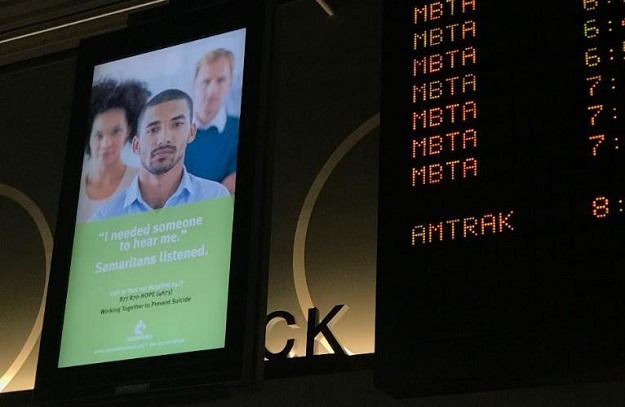Engineering Research Psychologist Scott Gabree Wins “Future Generations” Award
Scott Gabree, PhD, received the Future Generations Award from the DuPage Railroad Safety Council in September 2018 for his work in railroad safety research. Gabree is an engineering research psychologist in the U.S. DOT Volpe Center’s Transportation Human Factors Division.
The Future Generations Award recognizes contributions to railroad safety that are forward thinking and aim to inspire younger generations to continue to pursue rail safety initiatives.
“It was an honor to be recognized,” said Gabree.
This award commended Gabree’s rail suicide prevention work. Gabree and his Volpe Center team are working with the Federal Railroad Administration (FRA) and with rail carriers from around the world to examine why rail suicides occur, and identify and implement ways to prevent them.
“It’s meaningful work,” said Gabree, noting that suicide wasn’t addressed on a broad scale in the rail industry until very recently. “It’s a hard problem that is addressable.”
Addressing rail suicide: 6 key research areas
FRA has long focused on safety improvements to reduce grade crossing and trespass deaths, but suicide was not historically considered alongside those efforts. However, in 2011, FRA began systematically collecting suicide data from U.S. rail carriers and actively participating in suicide prevention efforts and studies.
Over the past decade, research from rail suicide prevention experts in Europe, Canada, and Australia has illuminated strategies that can reduce rail suicides.
The Volpe Center and FRA built on this global research to develop a program with six focus areas to identify ways to reduce rail suicide:
- Suicide countermeasure pilot projects
- Media reporting of trespass and suicide incidents
- The Global Railway Alliance for Suicide Prevention (GRASP)
- Trespasser intent determination
- Demographic and environmental characteristics of rail suicides
- GIS mapping of rail trespass and suicide
Watch video highlights about Scott Gabree’s work and visit Rail Suicide Prevention to learn more.
Partnering with rail carriers
The current body of research on rail suicide prevention is sparse. Because good data is critical to understanding rail suicides, some of these research areas focus on understanding the types and quality of rail suicide data available in the U.S. Other areas focus on evaluating mitigation strategies and identifying ways to implement them.
“There’s not a lot of data out there, so we’re trying to convince people to be pioneers,” said Gabree.
Gabree and his colleagues are pursuing partnerships with rail carriers to collect data and to identify, implement, and evaluate appropriate mitigation strategies. One such evaluation is underway with the Massachusetts Bay Transportation Authority (MBTA).
MBTA is partnering with the Samaritans charity to promote Samaritans’ 24/7 toll-free suicide helpline: 988. FRA has sponsored a research effort at Volpe to help understand the impact of this campaign. By promoting the helpline in public spaces, MBTA and Samaritans believe they will reach a wide audience, reduce the number of suicide attempts on the rail system, and help reduce all suicides in Massachusetts.
“If rail carriers can do something in their spaces to promote mental health and help services, it has a broader impact on people when they come to—and even after they leave—those spaces,” said Gabree.

MBTA uses its station notification boards to promote the Samaritans’ toll-free suicide helpline. The Volpe Center is working with the Samaritans to track the impact of this collaboration. (Volpe photo)
About the DuPage Railroad Safety Council
The DuPage Railroad Safety Council is a nonprofit organization made up of railroad professionals, government officials, law enforcement, engineers, educators, and private citizens who examine ways to heighten awareness and improve safety at highway-railroad crossings. The council works with civic, law enforcement, and railroad leaders to eliminate deaths and injuries along railways.

Scott Gabree received the Future Generations Award from the DuPage Railroad Safety Council for his work in rail suicide prevention. Gabree and his Volpe Center team are working with FRA and with rail carriers from around the world to examine why rail suicides occur, and identify and implement ways to prevent them. (Volpe photo)
Recent Presentations by Scott Gabree
“Rail Suicide Prevention” (9/27/2018): A presentation at the DuPage Rail Safety Council 12th Biennial Conference in Oak Brook, IL.
“Rail Trespass and Suicide Prevention” (3/22/2018): A presentation at the Illinois Commerce Commission’s Rail Safety Summit in Chicago, IL.
“Talking about Rail Suicide” (1/09/2018): A presentation at the 2018 TRB Annual Meeting in Washington, D.C.
“Media Reporting of Trespass and Suicide Incidents” (9/27/2017): A presentation at the “Breaking the Silence” symposium with Metra in Chicago, IL.
“Opportunities to Reduce Crossing Fatalities” (8/15/2017): A presentation at the 2017 FRA Grade Crossing Research Needs Workshop in St. Louis, MO.
